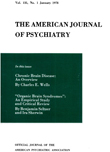Adverse effects of antiparkinson drug withdrawal
Abstract
The authors conducted a double-blind, controlled study to test the behavioral, affective, and neurological effects of antiparkinson drug discontinuation. Patients were evaluated at baseline and at 2 and 4 weeks. Of 24 placebo patients 9 left the study early because of adverse effects; none of the 8 patients in the antiparkinsonian group did so. The placebo group had significantly more lower extremity movements, motor agitation, hallucinations, and physical complaints at 2 weeks and scored significantly higher in depression at 4 weeks. A sizable proportion of chronic, drug-treated schizophrenic patients appear to need antiparkinsonians for clinical stability.
Access content
To read the fulltext, please use one of the options below to sign in or purchase access.- Personal login
- Institutional Login
- Sign in via OpenAthens
- Register for access
-
Please login/register if you wish to pair your device and check access availability.
Not a subscriber?
PsychiatryOnline subscription options offer access to the DSM-5 library, books, journals, CME, and patient resources. This all-in-one virtual library provides psychiatrists and mental health professionals with key resources for diagnosis, treatment, research, and professional development.
Need more help? PsychiatryOnline Customer Service may be reached by emailing [email protected] or by calling 800-368-5777 (in the U.S.) or 703-907-7322 (outside the U.S.).



